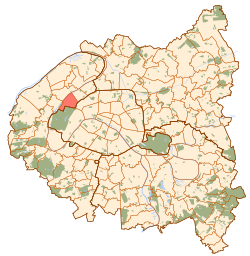Neuilly-sur-Seine
| Neuilly-sur-Seine | ||
|---|---|---|

Town hall
|
||
|
||
 Neuilly-sur-Seine within the Petite Couronne |
||
| Coordinates: 48°53′17″N 2°16′07″E / 48.8881°N 2.2686°ECoordinates: 48°53′17″N 2°16′07″E / 48.8881°N 2.2686°E | ||
| Country | France | |
| Region | Île-de-France | |
| Department | Hauts-de-Seine | |
| Arrondissement | Nanterre | |
| Canton | , | |
| Government | ||
| • Mayor (2014–2020) | Jean-Christophe Fromantin | |
| Area1 | 3.73 km2 (1.44 sq mi) | |
| Population (2010)2 | 61,754 | |
| • Density | 17,000/km2 (43,000/sq mi) | |
| Time zone | CET (UTC+1) | |
| • Summer (DST) | CEST (UTC+2) | |
| INSEE/Postal code | 92051 / 92200 | |
| Elevation | 27–39 m (89–128 ft) | |
|
1 French Land Register data, which excludes lakes, ponds, glaciers > 1 km² (0.386 sq mi or 247 acres) and river estuaries. 2Population without double counting: residents of multiple communes (e.g., students and military personnel) only counted once. |
||
1 French Land Register data, which excludes lakes, ponds, glaciers > 1 km² (0.386 sq mi or 247 acres) and river estuaries.
Neuilly-sur-Seine (French pronunciation: [nøji syʁ sɛn]) is a French commune just west of Paris, in the department of Hauts-de-Seine. A suburb of Paris, Neuilly is immediately adjacent to the city and directly extends it. The area is composed of mostly wealthy, select residential neighbourhoods, and many corporate headquarters are located there.
Originally, Neuilly was a small hamlet under the jurisdiction of Villiers, a larger settlement mentioned in medieval sources as early as 832 and now absorbed by the commune of Levallois-Perret. It was not until 1222 that the little settlement of Neuilly, established on the banks of the Seine, was mentioned for the first time in a charter of the Abbey of Saint-Denis: the name was recorded in Medieval Latin as Portus de Lulliaco, meaning "Port of Lulliacum". In 1224 another charter of Saint-Denis recorded the name as Lugniacum. In a sales contract dated 1266 the name was also recorded as Luingni.
In 1316, however, in a ruling of the parlement of Paris, the name was recorded as Nully, a different name from those recorded before. In a document dated 1376 the name was again recorded as Nulliacum (the Medieval Latin version of Nully). Then in the following centuries the name recorded alternated between Luny and Nully, and it is only after 1648 that the name was definitely set as Nully. The name spelt Neuilly after the French Academy standard of pronunciation of the ill as a y (see IPA at the top).
Various explanations and etymologies have been proposed to explain these discrepancies in the names of Neuilly recorded over the centuries. The original name of Neuilly may have been Lulliacum or Lugniacum, and that it was only later corrupted into Nulliacum / Nully. Some interpret Lulliacum or Lugniacum as meaning "estate of Lullius (or Lunius)", probably a Gallo-Roman landowner. This interpretation is based on the many placenames of France made up of the names of Gallo-Roman landowners and suffixed with the traditional placename suffix "-acum". However, other researchers object that it is unlikely that Neuilly owes its name to a Gallo-Roman patronym, because during the Roman occupation of Gaul the area of Neuilly was inside the large Forest of Rouvray, of which the Bois de Boulogne is all that remains today, and was probably not a settlement.
...
Wikipedia

